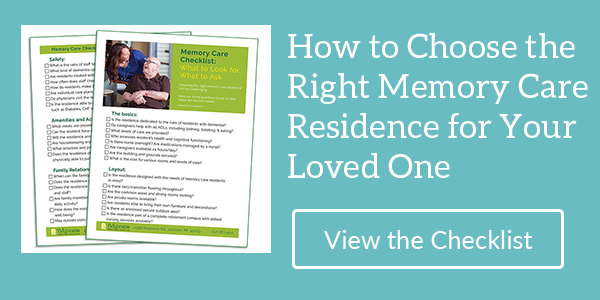When a loved one is diagnosed with dementia, it might seem at first that the family can rally the troops and take care of them at home. But as symptoms progress, the burden of care becomes heavier and begins to take a toll on caregivers and the person with dementia. Even when the loved one is adored and respected, the reality is that the most dedicated and well-intentioned family caregivers cannot provide the level of care given by trained professional memory care staff. As a result, the person with dementia may actually be missing out on activities, protections and treatments that improve outcomes.
Although it is a very difficult decision to make, sometimes making the move to a memory care facility sooner rather than later can have a very positive impact on the person’s quality of life.
Six things memory care facilities can provide dementia sufferers at all stages:
1) Highly trained staff.
Memory care is not just assisted living, it is highly specialized care addressing the specific needs of people with memory problems including dementia, Alzheimer’ disease and similar conditions. Staff in memory care facilities are trained and/or certified to provide the type of care dementia patients need to attain their highest level of functionality. From the way they speak to their patients to their understanding of the many medical, social and psychological factors involved, memory care professionals know how to manage the symptoms and behaviors that make home care so difficult. And they do it with compassion, a sense of humor and a smile.
2) Resident safety.
One of the scariest aspects of dementia is the potential for unsafe behavior or accidents. Memory care facilities go to great lengths to plan for all the possibilities based on cutting-edge studies and research. In memory care, residents receive 24/7 oversight by certified staff, bedrooms and other facilities are furnished and laid out to afford the utmost safety, and systems are in place via technology to ensure residents cannot wander, whether inside the building or outside in secure areas. Of course, memory care facilities are also accessible and have safety equipment built in to meet or exceed requirements of the Americans with Disabilities Act.
3) Resident comfort.
The staff and administrators of top memory care facilities understand that physical comfort extends not just to furniture but to many other aspects as well. Such things as paint colors and art themes that help residents recognize their surroundings, gathering areas that offer friendly and fun places to enjoy socializing, and plenty of windows that give residents views of natural areas that soothe and delight them. Everything is intended to make residents feel comfortable and comforted, help diminish anxiety and provide a home-like atmosphere.
Find out more about Brightside Memory Care in our blog, “Brightside Memory Care: Our new option.” If you have questions about short- or long-term care for a loved one with dementia, contact Brightside Assisted Living and Memory Care today or call Margaret Nagel at (517) 206-5000 or download our brochure to learn about our care levels, cost, and amenities.


